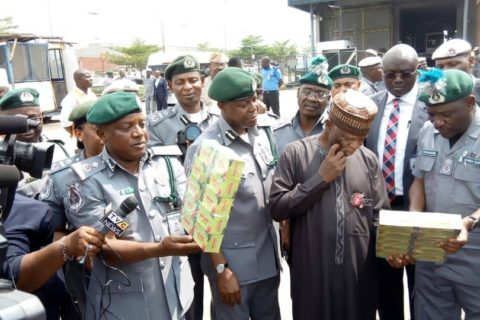COVID-19 Pandemic: Customs Service plans new means for cargo examination operations
The Nigeria Customs Service (NCS) said it has reduced the number of cargoes physically examined at the ports as part of measures to observe physical distancing and enhance cargo clearance operations at the port during COVID 19 pandemic.
Deputy Comptroller of Customs and representative of the NCS at the Presidential Enabling Business Environment Council (PEBEC), Anthony Anyalogu, stated this during an industry virtual meeting by Ships &Ports on Thursday.
Speaking on the theme, ‘Enhancing Cargo Clearance Operation in Nigeria during COVID-19,’Anyalogu, said while Customs cannot completely stop physical examination of cargoes because of high risks imports, it is planning to introduce the use of endoscopic cameras for inspection of cargoes that requires physical examination.
The inspection camera, he said, will help reduce physical contact and increase the speed of examination.
“During this COVID-19 period, the experts have told us that we should try to avoid contact and that was the idea Customs had that for us to prevent spread of the virus, we must do our processes with less contact and that means that we should increase the number and percentage of goods that go into scanning and green lane- which means no Customs examination.
“So, what we are doing now is to decrease the number of containers that will go into physical examination while we try to increase the percentage of goods that go into green and blue lanes.
“Because we cannot stop physical examination, we also have to look for what will replace it because it is mostly goods that are more susceptible to non-compliance that are physically examined.
“So we are planning to procure endoscopic cameras that could be used to inspect the containers to reduce offloading, physical contact and increase speed apart from scanners that take a long time to procure,” he said.
The Customs boss added that the number of alerts placed on cargoes have also reduced to as low as 10 percent of all the total Customs transactions at the ports.
He noted that prior to the COVID -19 pandemic, most of the Customs processes have been automated with the deployment of the NICIS 11 platform, which allows importers and agents to make declaration and pay import duty online without interfacing with Customs.
“We have the Pre- Arrival Assessment Report (PAAR) that is done through the bank and comes in before the shipment arrives and you don’t need to come to Customs. Most of the Customs processes are now delivered at the trader zone, which means you don’t have to go to Customs to do them.
“Before now, if you want to do declaration, payment and assessment of duty you come to Customs but with the NICIS platform, all of that can be done by the trader without coming to Customs. It has allowed importers and agents to carry out their declaration in the comfort of their offices,” he said.
Speaking on why there is still human interface at the port, Anyalogu said, while Customs has achieved some level of automation of its processes through its single window platform, other relevant government agencies involved in cargo clearance are yet to integrate into the platform.
Vice President, Association of Nigerian Licensed Customs Agents (ANLCA) Kayode Farinto, however dismissed the claims by Customs, saying that physical examination of cargoes, which breeds human contact is still happening at the port.
Farinto suggested that Customs should invoke section 28 and 29 of the Customs and Excise Management Act (CEMA) which gives the Service power to implement the Bill of Sight and reduce the number of alerts placed on cargoes to lessen physical contact at the port.
He said, “The problem is that Customs is not ready to change and they don’t believe in Coronavirus pandemic because if they do, they would have streamlined human contact. Just yesterday, Customs sent another unit to be part of the examination at the port. We have advised that they invoke section 28 and 29 of CEMA because this is an abnormal situation.
“We still have more than five units that put intervention on cargo, which requires you visit all the units. If there is going to be an outbreak of the virus at the port, it is going to be caused by Customs because they are only protecting their officers and it is unfortunate they are not interested in the stakeholders.”
On his part, President, Africa Association of Professional Freight Forwarders and Logistics of Nigeria (AFFLON), Otunba Frank Ogunojemite, stressed the need for government to put in place necessary port infrastructures including scanners, develop the single window platform for all agencies to improve cargo clearance at the port.

